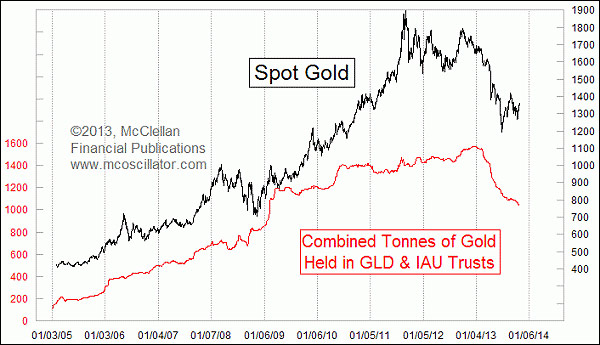Gold prices peaked at 95 back in 2011, but it took a while for gold bullion ETF investors to start fleeing the decline in gold prices. This week's chart shows that the total combined assets in GLD and IAU (the two biggest gold bullion ETFs) peaked in late 2012, a year after gold prices. And even though gold appears to have put in a good bottom in June 2013, these ETFs' investors continue to flee, forcing the ETF sponsoring firms to sell gold bullion to meet redemptions.
Those continued redemptions may be keeping a lid on gold's ability to rebound, but the big drop in total holdings of these ETFs also represents a big opportunity for gold prices to come back up again once ETF investors stop fleeing. Generally speaking, gold prices tend to do better when this measure of total combined assets is above its own 50-day moving average, as shown in this next chart.
Zooming in closer in this chart allows us to see that the combined assets level appears to be trying to find a bottom as gold prices have been rebounding in October 2013. But the combined assets plot is not yet up to its 50MA, and we are not yet really seeing a big rush back into these ETFs.
[Hear More: John Doody: Gold in Contraction & Consolidation Phase]
One additional indicator I like to use with these data is a simple 2-week percentage change in the assets level. It is very easy to calculate, examining today's value compared to that of 2 weeks ago, and noting how much it has changed.
When this indicator gets outside of plus or minus 2%, it shows an extended condition, as investors are rushing too quickly into or out of these ETFs. Often that sort of extended condition can mark a nice turning point for prices as was the case just recently when this indicator went to -3.0% on Oct. 21, 2013, just one trading day after gold prices bottomed.
But it is worth noting that during really strongly trending periods for gold prices, an extreme reading during a rush into or out of these ETFs cannot hold back the price trend. In the weeks leading up to the 2011 gold price top, this indicator spiked up to +5%, and gold did not stop its ascent. Similarly, during the worst part of the price decline in early 2013, the extreme low readings for the 2-week change indicator only marked brief pause points for the downtrend.
Spot gold prices appear to be trying to break the declining tops line that has contained prices all during 2013. Investor sentiment toward gold remains bearish, and that is a hopeful sign that it could turn bullish. So I'll be watching in the days ahead to see if gold bullion ETF investors start migrating back in.
Related Charts
May 24, 2013 | Aug 22, 2013 | Dec 13, 2012 |











